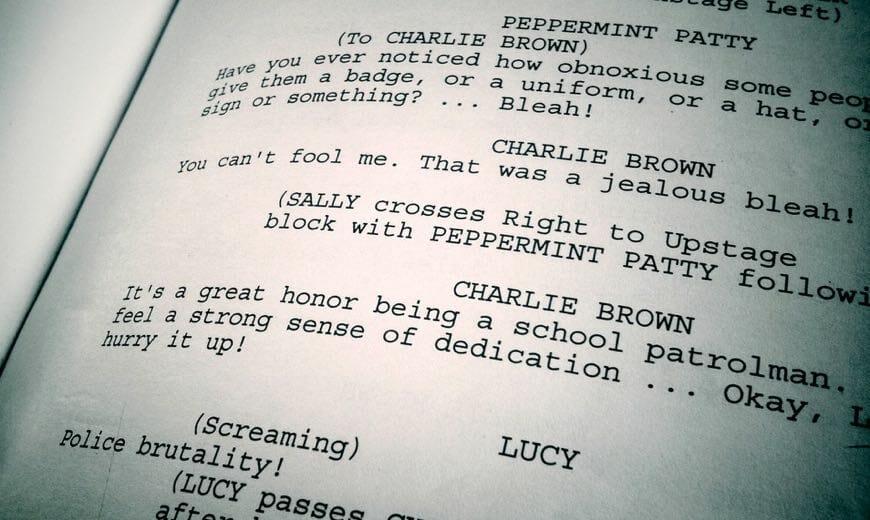Okay, so you were trained as an actor, you know everything about theater, vocal techniques, movement, scene study, improvisation, acting on camera, auditioning and the list goes on. But what about writing? Film making? Cinematography? Directing? Producing?
When you graduate from acting school, you rarely have the full knowledge of what it requires to sustain a career in the film industry. Only a few lucky actors will be able to act their entire life without having to step behind the camera. Because the film industry changed over the years, it became indispensable to learn about the positions behind the camera. Not only will it serves your work as an actor, it will also help you create your own content.
Where to begin in this vast realm of knowledge? The answer is: WRITING! Writing is the starting point of any film projects you have in mind. The map that will guide your throughout your creation. Without a strong scenario, you wont be able to express your vision fully to the screen.
Yes you Can!
And how do you start writing when you have barely any knowledge about screenwriting? First and foremost; stop saying you CAN’T write. YES YOU CAN! Anybody can! All you need is consistent practice and multiple trial an error. Judging yourself and your capabilities is the worst thing you can do at the beginning of this process; and I’m speaking from experience. For so many years, I stopped myself from writing because I thought I couldn’t. I’m not saying that I’m a master at writing now, all I’m saying is that I allowed myself to grow with time.
Brainstorm Ideas
Now that you’ve accepted that you can write; start by brainstorming ideas in a notebook. Genres or themes you would like to explore, stories you would like to tell, characters you would like to play, etc. Write as much as you can so you can save this information for later, when you need ideas to create more projects. After lashing out all your ideas, look at them and pick one that you feel close to at the moment. Based on the chosen topic, start brainstorming about story line ideas, characters, locations, etc. Once again, write everything that comes to your mind without judgement. Thinking about production at this point in time will only limit you in your creativity.
Draft a Skeleton
Brainstorming is probably the easiest part in writing. The following steps require more work and technique but you are still capable of doing them. The next step is to draft a skeleton of your scenario idea. This will help you writing each scenes afterward. The skeleton can be as long or as short as you want based on the length of your film. Try to visualize each scenes of your film and then write a key line to best describe each of them. This might include the location where it takes place, the characters in the scene and what happens in each of them. If you need help to write a strong skeleton, I suggest you read the book Save the cat! by Blake Snyder. This will help you in making strong choices in the development of your skeleton.
Write the scenario
Once you’ve got the skeleton of your film, you want to start writing each scene individually. A lot of people find it difficult to write dialogue, but I think that the key; is to make the characters really clear to you before starting. Put yourself in their mind; and speak the lines out loud, as you are writing, if you need to. Another technique that I find really useful is: improvisation. Partner up with an actor friend and improvise around whats supposed to happen in the scene. Make sure you have a recording device at your disposal so you can go back and map out the golden moments.
Modifications and Rewriting
Once you’ve got all your scenes written, it’s all about correcting and rewriting. Send it to actor and writer friends you trust and take notes of their feedback. Stay open to receive any critical notes and use them to reinforce your story and make it clearer. Try to see if they got the message you wanted to tell with this film. If not, what scene could you modify to make it easier to understand. My first tip: don’t jump into rewriting right after you’ve received some notes. Let them sink in so you can go back to writing with a clear head and your full attention.

 Watch with Premium Membership - Thriller Filmmaking Techniques – Crafting Tension on Screen with Shane Stanley
Watch with Premium Membership - Thriller Filmmaking Techniques – Crafting Tension on Screen with Shane Stanley 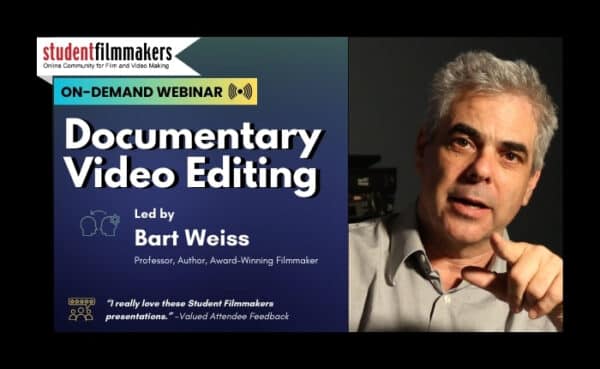 Included with Premium Membership - On-demand Documentary Video Editing
Included with Premium Membership - On-demand Documentary Video Editing  Enroll with Premium Membership – Bethany Rooney and Patrick Cady, ASC – Directors Tell the Story
Enroll with Premium Membership – Bethany Rooney and Patrick Cady, ASC – Directors Tell the Story  Included with Premium Membership - Embark on Your Cinematographic Journey with Ian Kerr, CSC
Included with Premium Membership - Embark on Your Cinematographic Journey with Ian Kerr, CSC  Free Live Webinar: Studio Set Lighting Led by Christopher Baffa, ASC
Free Live Webinar: Studio Set Lighting Led by Christopher Baffa, ASC 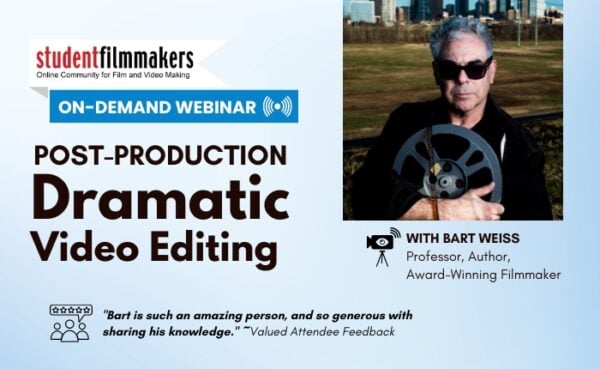 Included with Premium Membership - Post-production and Dramatic Video Editing
Included with Premium Membership - Post-production and Dramatic Video Editing 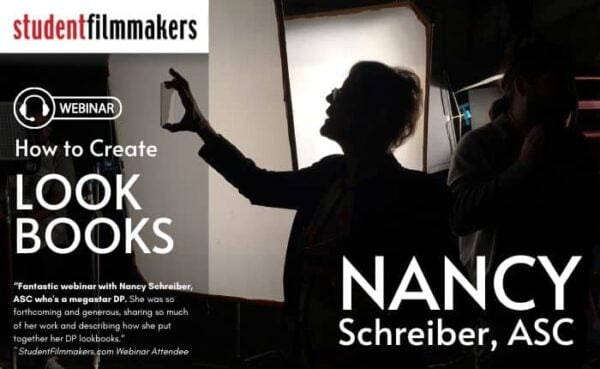 Included with Premium Membership - Nancy Schreiber, ASC: “On Demand How to Create Look Books Webinar”
Included with Premium Membership - Nancy Schreiber, ASC: “On Demand How to Create Look Books Webinar”  Included with Premium Membership – Unleash the Power of Action Sequence Photography with Paul Hughen ASC, DGA
Included with Premium Membership – Unleash the Power of Action Sequence Photography with Paul Hughen ASC, DGA  In-Person Workshop - "Creative Lighting Techniques for Film & TV" Led by David Landau - Manhattan, NYC, New York
In-Person Workshop - "Creative Lighting Techniques for Film & TV" Led by David Landau - Manhattan, NYC, New York  Included with Premium Membership – Behind the Scenes with Steven Poster ASC
Included with Premium Membership – Behind the Scenes with Steven Poster ASC  Included with Premium Membership - Discover the Art of Composition and Framing with Christopher Baffa, ASC: “On Demand”
Included with Premium Membership - Discover the Art of Composition and Framing with Christopher Baffa, ASC: “On Demand”  Included with Premium Membership - Unlock the Secrets of Successful Filmmaking with Jaron Presant, ASC
Included with Premium Membership - Unlock the Secrets of Successful Filmmaking with Jaron Presant, ASC  In-Person Workshop - "Lighting for Mood" Led by David Landau - Manhattan, NYC, New York
In-Person Workshop - "Lighting for Mood" Led by David Landau - Manhattan, NYC, New York  In-Person Workshop - "Lighting for Movement in Film and TV" Led by David Landau - Manhattan, NYC, New York
In-Person Workshop - "Lighting for Movement in Film and TV" Led by David Landau - Manhattan, NYC, New York  In-Person Workshop - "Basic Lighting Techniques for Film and TV" Led by David Landau - Manhattan, NYC, New York
In-Person Workshop - "Basic Lighting Techniques for Film and TV" Led by David Landau - Manhattan, NYC, New York  Included with Premium Membership Basics of Color Correction in Post-Production
Included with Premium Membership Basics of Color Correction in Post-Production 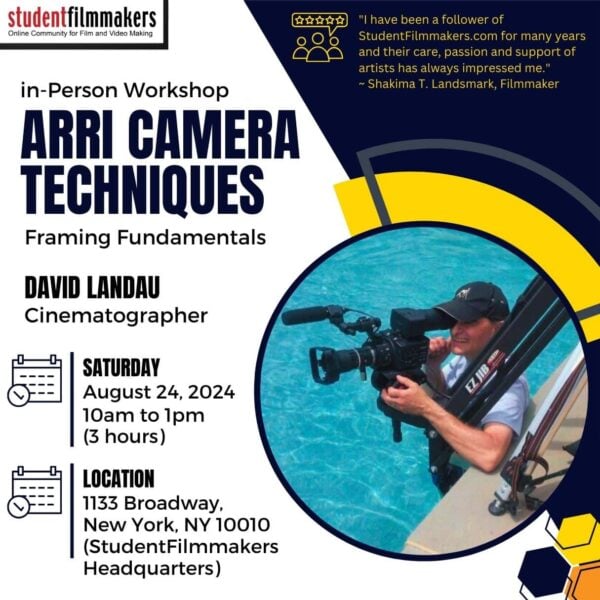 In-Person Workshop - "ARRI Camera Techniques: Framing Fundamentals" Led by David Landau - Manhattan, NYC, New York
In-Person Workshop - "ARRI Camera Techniques: Framing Fundamentals" Led by David Landau - Manhattan, NYC, New York 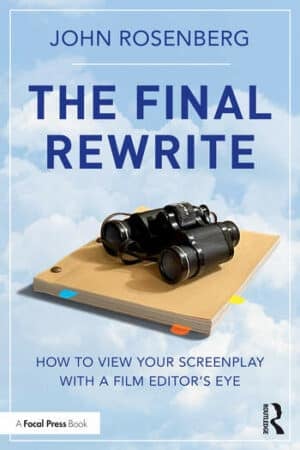 The Final Rewrite: How to View Your Screenplay with a Film Editor’s Eye
The Final Rewrite: How to View Your Screenplay with a Film Editor’s Eye 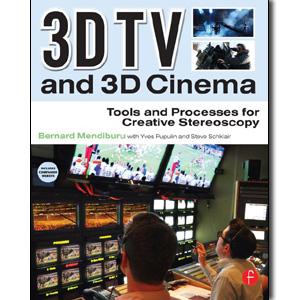 3D TV and 3D Cinema: Tools and Processes for Creative Stereoscopy
3D TV and 3D Cinema: Tools and Processes for Creative Stereoscopy  Killer Camera Rigs That You Can Build: How to Build Your Own Camera Cranes, Car Mounts, Stabilizers, Dollies, and More!
Killer Camera Rigs That You Can Build: How to Build Your Own Camera Cranes, Car Mounts, Stabilizers, Dollies, and More! 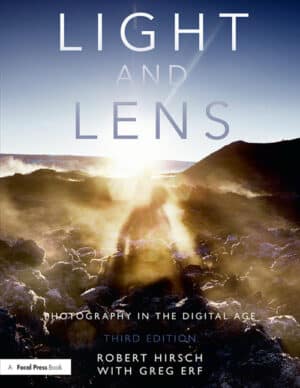 Light and Lens: Photography in the Digital Age, 3rd Edition
Light and Lens: Photography in the Digital Age, 3rd Edition  Color Grading 101: Getting Started Color Grading for Editors, Cinematographers, Directors, and Aspiring Colorists
Color Grading 101: Getting Started Color Grading for Editors, Cinematographers, Directors, and Aspiring Colorists  Aesthetic 3D Lighting: History, Theory, and Application, 1st Edition
Aesthetic 3D Lighting: History, Theory, and Application, 1st Edition  Digital Compositing with Nuke
Digital Compositing with Nuke 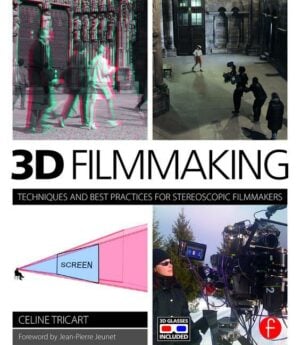 Techniques and Best Practices for Stereoscopic Filmmakers
Techniques and Best Practices for Stereoscopic Filmmakers 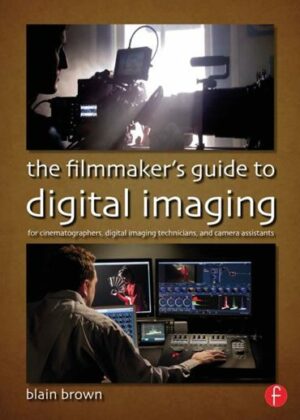 The Filmmaker's Guide to Digital Imaging: For Cinematographers, Digital Imaging Technicians, and Camera Assistants
The Filmmaker's Guide to Digital Imaging: For Cinematographers, Digital Imaging Technicians, and Camera Assistants 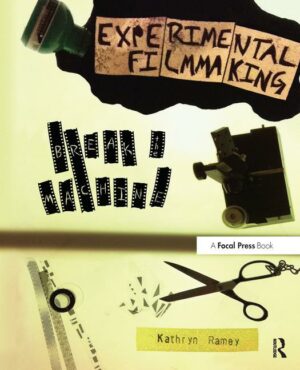 Experimental Filmmaking: Break the Machine
Experimental Filmmaking: Break the Machine 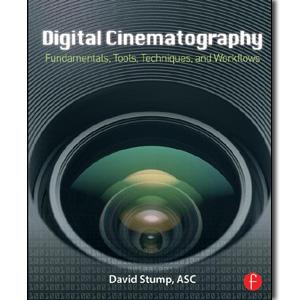 Digital Cinematography: Fundamentals, Tools, Techniques, and Workflows
Digital Cinematography: Fundamentals, Tools, Techniques, and Workflows  Storaro WRITING WITH LIGHT, Vol.4, "The MUSES", Limited Edition Autographed Book
Storaro WRITING WITH LIGHT, Vol.4, "The MUSES", Limited Edition Autographed Book 